The correct phrase is “How are you faring?” This expression is used to inquire about someone’s well-being, circumstances, or progress in a particular context.
In contrast, “fairing” is a term that pertains to improving the shape of an object or smoothing it out, often used in specific technical or artistic contexts.
Navigating the English language can sometimes feel like traversing a minefield of similar-sounding words and phrases that possess different meanings.
Two such phrases, “fairing” and “faring,” are often confused, which can lead to miscommunication or misunderstanding in both spoken and written contexts.
The nuances of language play a critical role in effective communication, and being able to distinguish between terms can enhance clarity and understanding in conversations.
In an age where precise language use is increasingly valued—particularly in professional settings and informal communication alike—understanding these differences becomes essential. “Faring” comes from the verb “fare,” which means to get along or to be in a certain state.
When you ask someone how they are “faring,” you are essentially asking about their state of being, their progress, or how well they are coping with matters.
On the other hand, “fairing” relates primarily to the realm of engineering and design, where it refers to the process of making an object smooth or shaping it for better performance, particularly in contexts like aircraft or boat design.
You might also enjoy:Which of the Following: Definition + Complete Usage + Grammar

In this exploration of “How Are You Fairing or Faring?” we will delve deeply into the meanings and uses of each term.
We will provide clear definitions, present examples in various contexts, and discuss how each phrase fits into everyday language.
By shedding light on these terms and their appropriate contexts, we aim to enhance your understanding of English syntax and usage, enabling you to communicate with greater confidence and precision.
Let’s dive into this linguistic journey to clarify the distinctions between “fairing” and “faring,” ensuring that your conversations are both accurate and effective.
Certainly! The terms “fairing” and “faring” can be confusing, as they sound similar but have different meanings and usages. Here’s a comprehensive guide on how to distinguish between them, along with examples in various situations.
Understanding “Faring” and “Fairing”
- Meaning of “Faring”
“Faring” is the present participle of the verb “fare,” which refers to how someone is doing or progressing in a situation. It is often used in the context of well-being or outcomes.
Example: “How are you faring with your new job?”
- Meaning of “Fairing”
“Fairing” is a noun that refers to a device or structure, often found in aerodynamics or maritime contexts, intended to smooth airflow.
Example: “The car’s fairing was designed to improve fuel efficiency.”
Contexts and Usage Examples
- Daily Conversation
Question: “How are you faring in school this semester?”
Context: A casual inquiry about academic performance.
- Health Check
Question: “How are you faring after your surgery?”
Context: Concern expressed by a friend or relative about recovery.
- Work Environment
Question: “How are you faring with the new software?”
Context: A coworker checking on someone’s adaptation to new tools.
- Travel Inquiry
Question: “How are you faring on your trip?”
Context: Asking a friend about their travel experiences and enjoyment.
- Emotional Wellness
Question: “How are you faring emotionally after the breakup?”
Context: A supportive inquiry regarding someone’s mental health.
- Performance Review
Question: “How are you faring against your sales targets?”
Context: A manager assessing an employee’s performance metrics.
- Family Check-in
Question: “How are the kids faring with online school?”
Context: A parent asking about children’s adaptation to remote learning.
- Sports Performance
Question: “How is the team faring in the tournament?”
Context: A fan inquiring about the team’s status in a competition.
- Social Gatherings
Question: “How are you faring at the party?”
Context: Someone checking if you’re enjoying the social event.
- Community Activity
Question: “How are you faring with the community project?”
Context: Volunteering or participating in local initiatives.
You Might Also Enjoy:Reinforce Vs Reenforce: 10 Differences + Examples [2025]
Additional Examples in Different Situations
- Financial Inquiry
Question: “How are your investments faring in the market?”
Context: Discussing economic trends and personal finance.
- Mentoring Situation
Question: “How are you faring in your career development?”
Context: A mentor checking on a mentee’s progress.
- Weather Updates
Question: “How is your area faring with the storm?”
Context: Checking if someone is safe during inclement weather.
- Creative Projects
Question: “How is your writing project faring this week?”
Context: A friend asking about progress on a literary endeavor.
- Academic Performance Check
Question: “How are you faring in your advanced math class?”
Context: A peer inquiring about difficulty levels in a course.
- Friend’s Progress
Question: “How are you faring with your fitness goals?”
Context: A friend wanting to know about personal health achievements.
- Product Development
Question: “How is the new product faring in the market?”
Context: A business assessing consumer response to new releases.
- Household Inquiry
Question: “How are you faring with your home renovations?”
Context: Asking about the progress of remodeling work.
- Crisis Recovery
Question: “How is the community faring post-disaster?”
Context: Evaluating the recovery process after a traumatic event.
- Online Community
Question: “How are users faring with the new website design?”
Context: Gathering feedback on user experience.
Further Discussion on “Fairing”
- Aviation Engineering
Example: “The fairing on the aircraft reduces drag.”
Context: Used in engineering discussions about design optimization.
- Automotive Design
Example: “The fairing of the bike enhances its aerodynamic posture.”
Context: Technical discussions among automotive enthusiasts.
- Maritime Context
Example: “The ship’s fairing was crucial for smooth sailing.”
Context: Discussions about nautical design.
- Model Airplanes
Example: “The fairing is important for the stability of the model.”
Context: Invoking fairings in hobbyist discussions.
- Spacecraft Engineering
Example: “The fairing protects the payload during launch.”
Context: Aerospace discussions on structural components.
You might also enjoy:Where Does “How is your Day Going?” Originate From?
Variations in Expression
- Colloquial Inquiry
Example: “How’s it going? How are you faring?”
Context: A casual greeting that checks in.
- Formal Inquiry
Example: “I hope you are faring well in your endeavors.”
Context: A more formal communication, such as in a letter.
- Social Media Interaction
Example: “How are you faring in this lockdown?”
Context: A modern context suitable for social platforms.
- Festival Participation
Example: “How are the festivities faring this year?”
Context: Checking on the success of events.
- Technology Feedback
Example: “How is the app faring with its updates?”
Context: Gathering feedback on software performance.
Additional Reflections
- Seasonal Check-In
Example: “How are you faring with the seasonal changes?”
Context: Discussing issues related to weather or mood.
- Children’s Activities
Example: “How are your kids faring in their sports activities?”
Context: Parents comparing notes on children’s progress.
- Crisis Situations
Example: “How are you faring amid all the chaos?”
Context: A sensitive inquiry during a difficult time.
- Diet and Nutrition
Example: “How are you faring with your new diet plan?”
Context: Discussing personal health choices.
- Retirement Check-In
Example: “How are you faring in your retirement?”
Context: Friends evaluating life changes post-career.
You might also enjoy:Interested In or On: The Differences + Examples [2025]
Summary Points
- Build Rapport
Using “faring” can create a connection during conversations about well-being.
- Professional Tone
“Faring” often brings a more serious tone in business or formal discussions.
- Informal Context
Utilizing “faring” can be relaxed, as in casual gatherings.
- Understanding Audience
Adjust language based on the person you’re speaking with; “faring” is more formal.
- Cultural Variations
In some cultures, asking how someone is faring reflects concern and is appreciated.
Conclusion on Usage
- Clarifying Understanding
Phrasing questions with “how are you faring?” may invite deeper conversations about feelings.
- Avoiding “Fairing” Errors
In conversations about wellness, steer clear of “fairing” to maintain clarity.
- Expressing Interest
Asking how someone is faring shows genuine interest and care for their situation.
- Enhancing Vocabulary
Using “faring” can enrich vocabulary and provide variety in expressions.
- Literary Language
“Faring” is often seen in literature, enhancing the descriptive quality of writing.
You might also enjoy:What Kind of Vs What Kinds of – Differences + Examples [2025]
Practical Application
- Adapting Language Style
When asking someone about their progress or feelings, consider using “faring” for a sophisticated touch.
- Feedback Mechanism
Encouraging dialogues about how someone is faring can promote well-being.
- Language Learning
For language learners, understanding the difference between “faring” and “fairing” can avoid confusion.
- Empathy Expression
Using “how are you faring?” can express empathy and understanding of someone’s challenges.
- Long-term Relationships
Consistently checking in on how others are faring strengthens bonds in friendships or professional settings.
Understanding “Fairing”
The word “fairing” is a noun that primarily refers to a structure on a vehicle, aircraft, or boat that reduces drag and improves aerodynamics. It is commonly used in the context of engineering and design. For example:
- Example 1: The motorcycle’s fairing was damaged in the accident, affecting its aerodynamics.
- Example 2: Engineers are working on a new fairing design to improve the fuel efficiency of the aircraft.
In these examples, “fairing” refers to a physical component designed to streamline a vehicle and reduce resistance.
You might also enjoy:Too Cute Meaning Vs To Cute (To Vs Too) + Examples
Understanding “Faring”
On the other hand, “faring” is the present participle of the verb “fare,” which means to perform in a specific situation or to experience a particular outcome.
It is often used in the context of asking about someone’s well-being or progress. For example:
- Example 1: How are you faring in your new job?
- Example 2: Despite the challenges, the team is faring well in the competition.
In these examples, “faring” refers to how someone is doing or managing in a given situation.
Common Mistakes and Clarifications
A common mistake is using “fairing” when one means “faring.” This error often occurs because the two words sound alike. For instance:
- Incorrect: How are you fairing in your studies?
- Correct: How are you faring in your studies?
In the incorrect example, “fairing” is mistakenly used instead of “faring,” which changes the meaning of the sentence and makes it unclear.
Tips for Remembering the Difference
To avoid confusion, it’s helpful to remember the contexts in which each word is used. Here are a few tips:
- Fairing: Think of vehicles, aerodynamics, and engineering. If you’re talking about a physical structure designed to reduce drag, “fairing” is the correct word.
- Faring: Think of performance, well-being, and outcomes. If you’re asking about how someone is doing or managing, “faring” is the right choice.
More Examples
- Fairing:
- The spacecraft’s fairing protected the payload during launch.
- The boat’s fairing was streamlined to cut through the water more efficiently.
- Faring:
- The crops are faring better this year due to the favorable weather.
By understanding and correctly using “fairing” and “faring,” you can improve your communication and ensure that your intended meaning is clear.
Remember, “fairing” relates to physical structures and aerodynamics, while “faring” pertains to performance and well-being.
With these distinctions in mind, you’ll be able to use these words accurately and confidently in your conversations
You Might Also Enjoy: Top 60 Most Common Simple Sentences In English
Which one is correct How Are You Fairing or Faring?
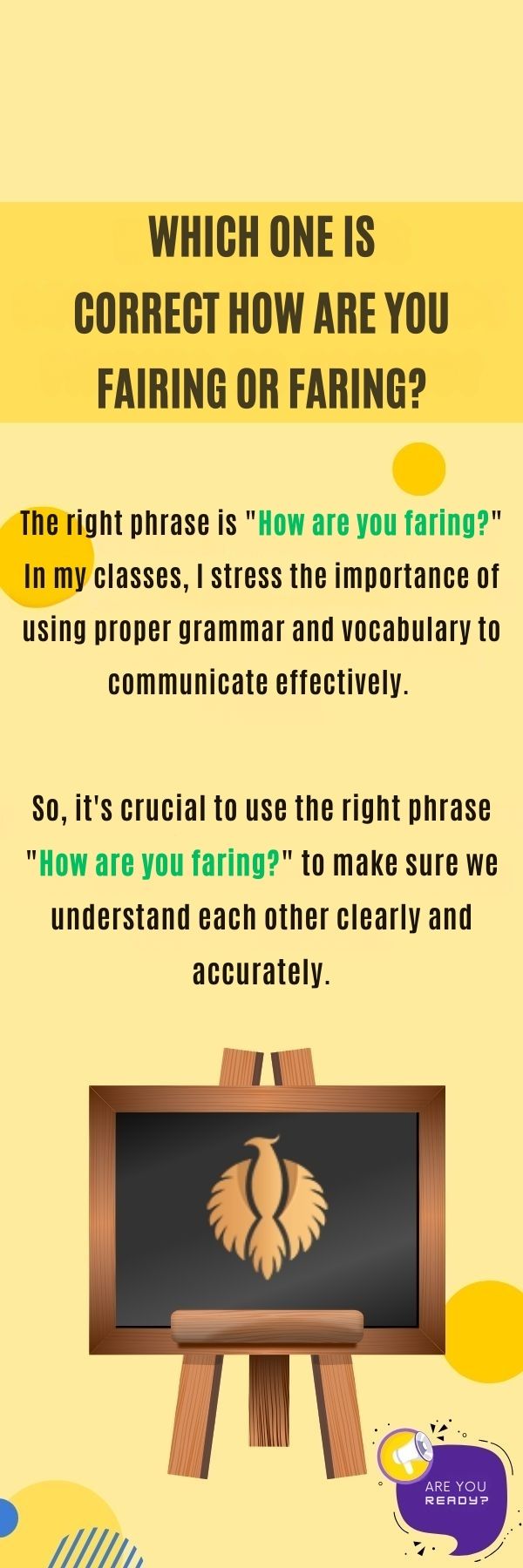
The right phrase is “How are you faring?” In my classes, I stress the importance of using proper grammar and vocabulary to communicate effectively.
So, it’s crucial to use the right phrase “How are you faring?” to make sure we understand each other clearly and accurately.
You might also enjoy: Thanks God or Thank God – Fully Explained + Video
Understanding the Difference

Understanding the difference between “How are you faring?” and ” fairing ” is super important for effective communication.
“How are you faring ?” is a complete phrase that people often use to ask how someone is doing or handling a specific situation. “
On the flip side, ” faring ” is a verb that means “to get along” or “to make progress.” On the other hand “fairing” is a noun and it means an external metal or plastic structure added to increase streamlining on a high-performance car, motorcycle, boat, or aircraft..
It’s often used in questions or statements to ask how someone’s doing. Like, “I wonder how he’s faring in his recovery.”
In my classes, I stress the importance of using proper grammar and vocabulary to get your point across accurately.
So it’s really important to understand the difference between the full phrase “How are you faring?” and just the word ” fairing ” to make sure you’re communicating clearly and effectively.
Decoding the Variations: “How Are You Fairing” versus “Faring” – Differences and Usage

In my classes, I often talk about how language can be all tricky and stuff, and how little changes can totally change what things mean.
One example is knowing the difference between “How are you faring?” and just plain “fairing.”
They might sound alike, but they’re actually used in different ways. “How are you faring?” is a whole phrase that people use all the time to ask how someone’s doing or what’s going on with them.
It’s like asking how someone’s dealing with a certain situation.
For example, you might say to a friend, “How are you faring in your new job?” Knowing these differences is super important for good communication.
By using the right phrase or verb, we can make our intentions clear and make sure our message is understood correctly.
You might also enjoy:Emersion Vs Immersion: Meaning, Differences, and Examples
Unraveling the Meaning: “How Are You Fairing” or “Faring”? Examples and Clarifications
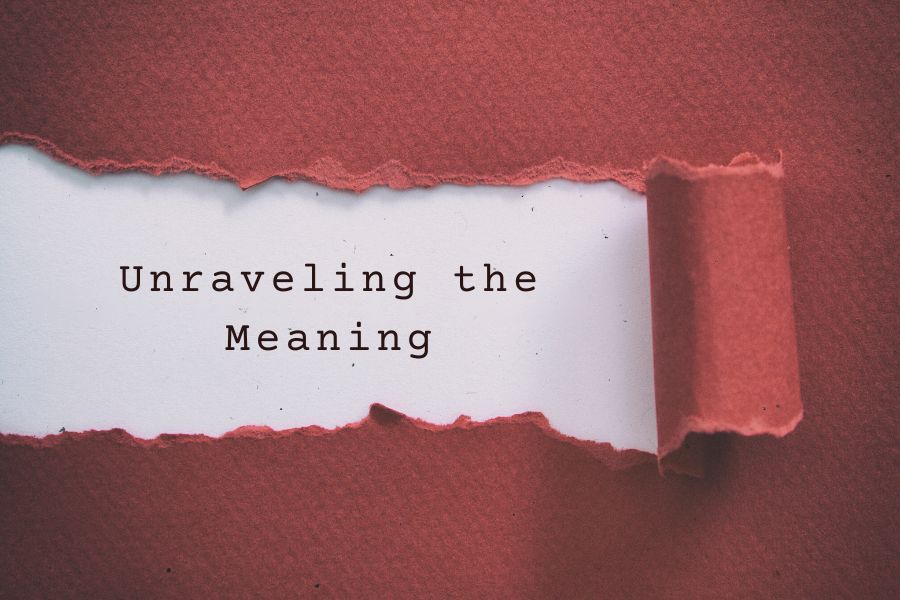
Understanding the difference between “How are you faring?” and just “Faring” is super important for good communication.
“How are you faring?” It’s like asking if everything is okay or if they’re having any troubles.
For example, “How are you faring in your new job? Are you getting used to the workload?” On the other hand, “faring” is a verb all on its own that means “getting along” or “making progress.”
People often use it in questions or statements to ask about how things are going or what the result is.
Like, Have you made any big progress?” So, it’s really crucial to get the difference between the full phrase “How are you faring?” and just “faring” so that we can communicate clearly and effectively.
If we use these phrases right, we can have meaningful conversations and show genuine concern for other people’s well-being and progress.
You might also enjoy:Looking Forward To Seeing You: Grammar + Examples[2025]
Exploring the Nuances: “How Are You Fairing” versus “Faring” – Examples and Insights

In my classes, I always tell my students to check out the little things in language so they can be better at communicating.
Today, let’s dive into the differences between “How are you faring?” and “Faring” to understand them better. When we say “How are you faring?”, It shows that we care and want to know.
For example, you could ask a friend, “How are you faring in your new job?” to find out how they’re doing academically.
By looking at these differences, we can choose the right phrase to say what we mean.
So, remember to use “How are you faring?” when you care and “fairing” Knowing these small things will definitely make you better at communicating.
Comparing the Phrases: “How Are You Fairing” or “Faring”? Differences and Real-life Examples
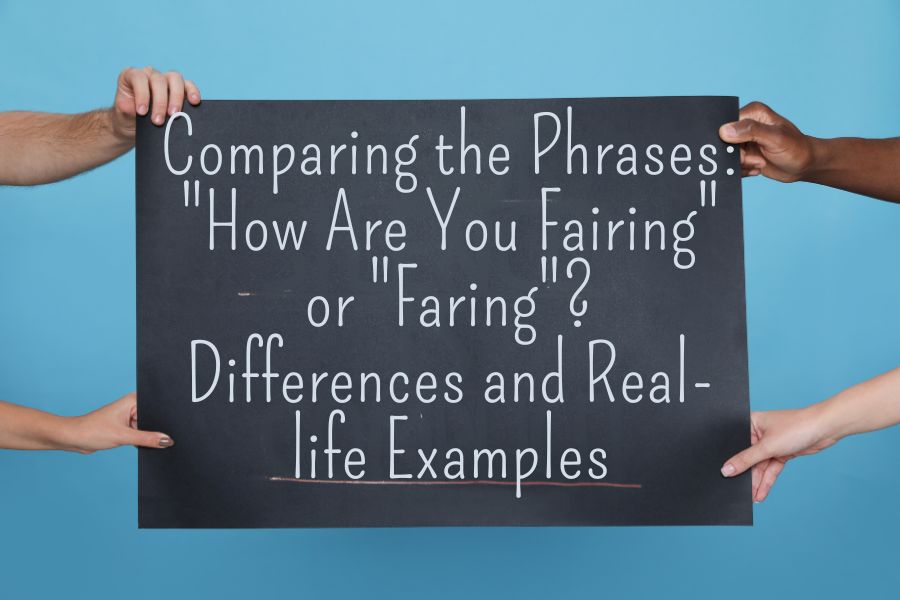
In my classes, I always talk about how language can be different and how small changes in phrases can affect communication.
When comparing the phrases “How are you faring?” and “fairing,” it’s important to know the differences and how they are used in real life.
The phrase “How are you faring?” is a complete question that shows concern for someone’s well-being or current situation.
It’s like asking how someone is doing or getting along in a specific situation.
For example, you might ask a friend, “How are you faring in your new job?” On the other hand, “faring” is a verb that means “to get along” or “to make progress.”
It’s often used in questions or statements to ask about someone’s progress or how things are going.
For example, you might ask, “How are you faring in your studies?” to see how someone is doing academically.
Knowing these differences helps us communicate better and clearly express our intentions.
By using the right phrase in different situations, we can have meaningful conversations and show genuine interest in others’ well-being or progress.
You might also enjoy: Top 100 Commonly Used Verbs That Start With D [2024]
Shedding Light on the Usage: “How Are You Fairing” versus “Faring” – Examples and Explanations

In my classes, I often talk about phrases like ” How Are You faring?” Let’s check out these expressions and their differences.
” How Are You faring?” is correct as we said and pnce more “faring” is a verb that can stand alone and means “to get along” or “to make progress.”
We use it in questions or statements to ask about someone’s progress or outcome.
For instance, you could ask, “How are you faring in your studies?” or say something like, “I wonder how he is faring in his recovery.”
Understanding the difference between the full phrase “How are you faring?” By understanding these details, my students can express themselves accurately and have meaningful conversations.
You might also enjoy: In The Office or At The Office: 7 Key Differences [2024]
Mastering the Correct Phrase: “How Are You Fairing” or “Faring”? Differences and Usage Guidelines
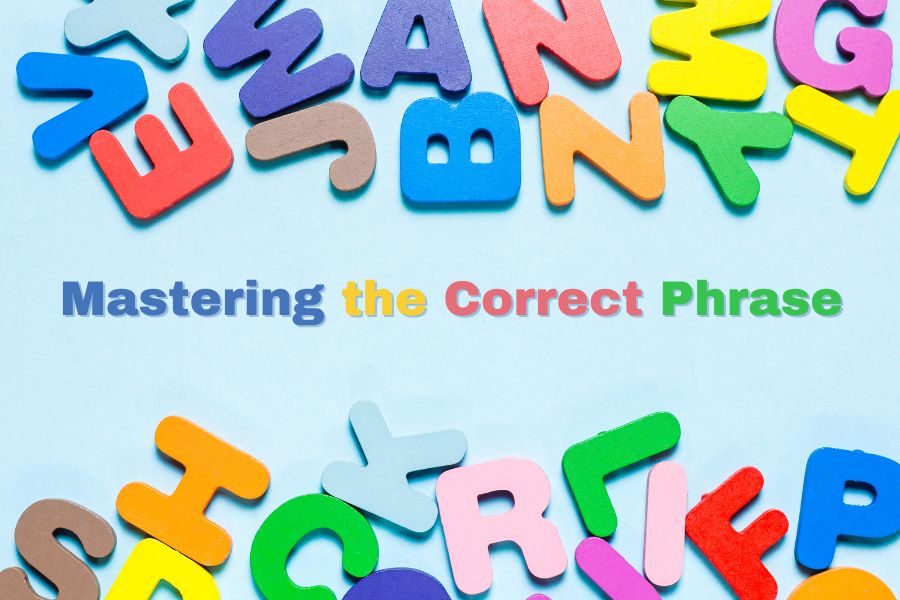
Mastering the right phrase “How you faring?” or “How’s it faring?” is super important for talking to people.
Knowing the differences and when to use these expressions can help you have clear and accurate conversations. “How you faring?” you are genuinely interested in how they are doing.
On the other hand, ” faring ” is a verb that means “to get along” or “to make progress.” You can use it to ask about someone’s progress or outcome. Like “How you faring in your studies?” or “I wonder how he’s faring in his recovery.”
This is good to use when you want to ask about someone’s progress in a certain area.
In my classes, I always say how important it is to use the right phrase and understand how words can mean different things.
20 points about using How Are You Fairing or Faring
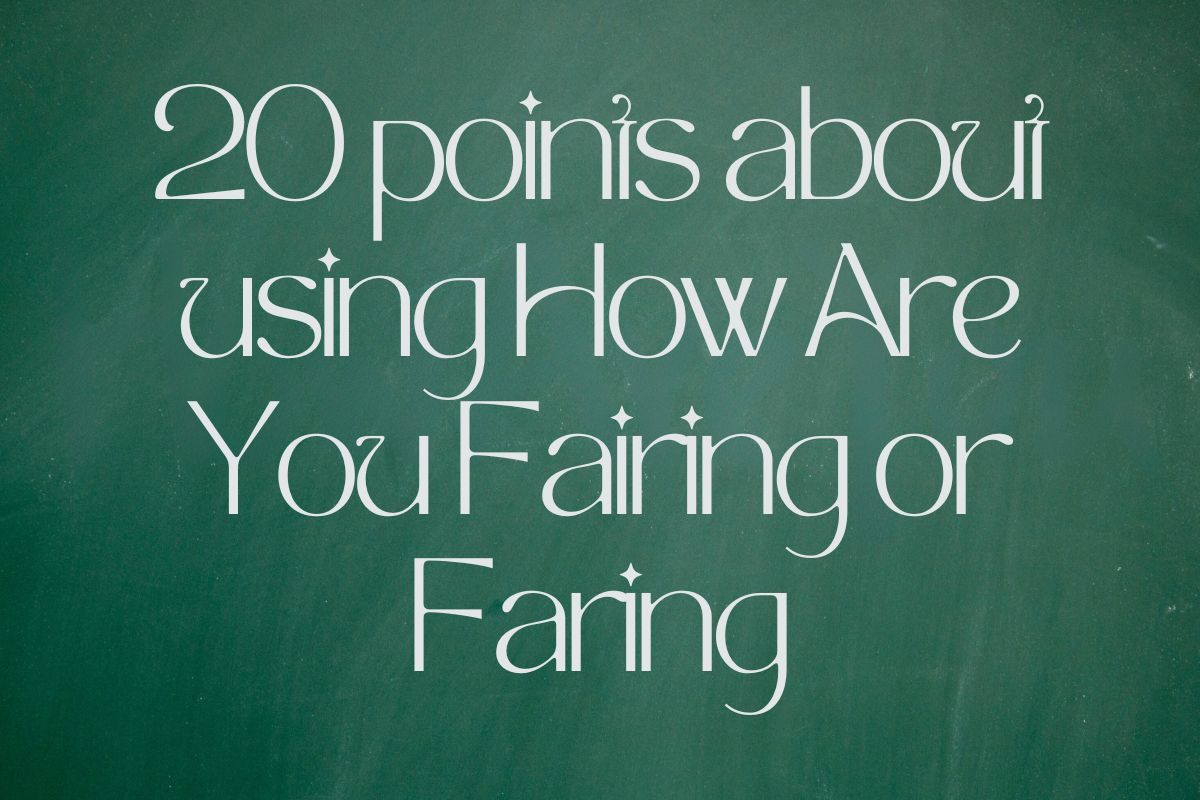
“How are you fairing?” and “How are you faring?” are both correct forms of the question, with slightly different nuances.
“Fairing” focuses on something being adjusted or working properly.
“Faring” is used to inquire about someone’s well-being or progress.
When asking about someone’s well-being, it is more common to use “faring.”
The choice between “fairing” and “faring” depends on the context and the intended meaning of the question.
Both words can be used to inquire about progress or adjustment in different situations.
“Fairing” is less commonly used in everyday conversation compared to “faring.”
It’s important to use the correct spelling and form of the word based on the context of your question.
Both words stem from Old English and have specific usage in the English language.
The distinction between “fairing” and “faring” highlights the nuances of the English language.
Understanding the differences between similar words like “fairing” and “faring” can help improve communication clarity.
Using the appropriate word can convey your message accurately.
It’s always good to be mindful of the subtleties in language when choosing between similar words.
Both “fairing” and “faring” can be correctly used in different situations depending on the intended meaning.
The context of the conversation can determine whether “fairing” or “faring” is the more suitable choice.
Being familiar with the definitions and usage of both words can enhance your language skills.
Practice using both “fairing” and “faring” in sentences to become more comfortable with their distinctions.
Checking a dictionary or language resource can provide further insight into the differences between these words.
Paying attention to how others use “fairing” and “faring” in context can also help you grasp their nuances.
Overall, both “fairing” and “faring” are correct in their respective contexts, so use them appropriately to communicate effectively.
Frequently Asked Questions
What is the difference between “fairing” and “faring” in the English language?
“Fairing” focuses on adjustment or working properly, while “faring” is used to inquire about someone’s well-being or progress.
Can you provide an example using “fairing” in a sentence?
Example: “The new software update is fairing well with minimal bugs reported so far.”
How about an example using “faring” in a sentence?
Example: “How are you faring after your surgery? Are you feeling better?”
Why is it important to understand the distinction between “fairing” and “faring”?
Understanding the difference ensures that you use the correct word to convey your intended meaning accurately.
When should I use “fairing” in a conversation?
Use “fairing” when discussing adjustment, performance, or proper functioning of something.
In what context should I use “faring”?
Use “faring” when inquiring about someone’s well-being, progress, or how they are doing in a situation.
Can you provide another example of using “fairing” in a sentence?
Example: “The team is fairing well in the competition, winning most of their matches.”
Conclusion
The distinction between “How Are You Fairing” and “How Are You Faring” lies in their meanings and applications.
The term “faring” inquiries about an individual’s well-being in a particular context or situation.
Conversely, “fairing” pertains to a structural component intended to minimize drag and enhance aerodynamics, commonly found in vehicles, aircraft, or boats.
When we use “faring,” we’re inquiring about someone’s performance or well-being in a particular context.
For example, asking “How are you faring in your new job?” is a way to check on someone’s progress or experience in their new role.
This usage is specific and situational, focusing on how someone is managing or coping with a particular set of circumstances.
Conversely, “fairing” is not used to ask about someone’s well-being. Instead, it is a term used in engineering and design to describe components that help streamline vehicles and reduce resistance.
For instance, a motorcycle’s fairing is a part that helps improve its aerodynamics, making it more efficient and easier to handle at high speeds.
We’ve looked at various instances where these phrases can fit into different scenarios.
For example, asking, “How are you managing with your new responsibilities?” showcases the proper use of “managing,” whereas “The spacecraft’s fairing shielded the payload during launch” demonstrates the correct application of “fairing.”
These illustrations emphasize the unique situations where each term is suitable.
By getting the hang of using “faring” and “fairing” correctly, you can make sure you’re communicating clearly and accurately.
Misusing these words can lead to confusion and misunderstandings, which can be particularly problematic in both personal and professional communication.
Understanding the difference between these words also helps in written communication.
Whether you’re writing an email, a report, or a casual message, using the correct word ensures that your message is understood as intended.
This is especially important in professional settings where precise language is crucial.
Moreover, teaching the correct usage of “faring” and “fairing” can help others improve their language skills.
In educational settings, emphasizing the importance of proper grammar and vocabulary can aid students in developing strong communication abilities.
This, in turn, can enhance their academic performance and prepare them for future professional endeavors.
The next time you encounter these terms, you’ll be ready to articulate your thoughts correctly.
Just keep in mind that “faring” relates to how someone is coping or handling a particular situation, whereas “fairing” pertains to a part that enhances aerodynamics.
By remembering these differences, you can steer clear of frequent errors and express yourself more clearly.
In summary, the correct phrase is “How are you faring?” This usage is crucial for clear and effective communication, especially in educational contexts where proper grammar and vocabulary are emphasized.
By using the right words, we can ensure that our messages are understood as intended, fostering better communication and understanding.
So, whether you’re asking about someone’s well-being or discussing engineering components, knowing the difference between “faring” and “fairing” will help you convey your thoughts accurately and confidently.

Hi, welcome to my blog! My name is Omid and I am thrilled to have you here! I am an English language teacher with 12 years of experience and hold multiple international certifications (TESOL, IELTS, TOEFL, PTE, CELTA). Additionally, I hold a PhD in Applied Linguistics with a specialization in Teaching English as a Second Language (TESL), which fuels my passion for teaching English and assisting others in mastering the language. To me, nothing is more rewarding than helping individuals enhance their English language abilities through various methods. So, let’s embark on this journey of learning English together.




